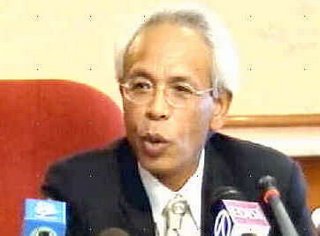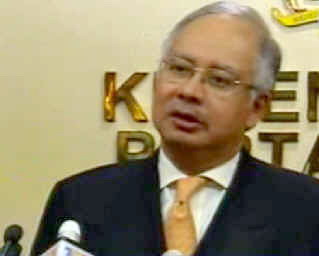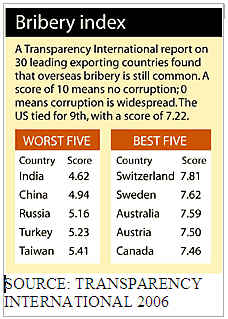SHAHRIR: DISCUSS Bumi EQUITY DATA for Truth; Concentrate on LEAKAGES; NAJIB: DON’T DISPUTE OFFICIAL DATA; MALAYSIA 25/30 in BRIBE PAYERS INDEX (BPI)
There are still quite a few Malays who are enlightened enough to see through the follies of this obsession with the equity percentage, but most are in the silent minority. Datuk Shahrir is one of them and is an exception who is brave enough to stick his neck out and make some meaningful and useful comments on this controversy which can be hurtful to those on the receiving ends. He further suggested that a more meaningful emphasis should be on the excessive “leakages” that are more insidious for its continuation .
When will the bred of more such Malays be reborn at this time simply to help them understand? They are forcing the issue, and forcing the crisis, for there still have time to change their ways.
The Malay race must learn the value of the individual man and its dependence upon other races and species and to comprehend its existence in the whole framework in physical reality. However, they faced two main problems and both involve the sacredness of the individual, and the individual's relationship with others and with all physically oriented consciousness.
The continuation of the NEP is just turning the clock back again for their future progress. Over a generation, the UMNO youth’s parents had their NEP fruits given to them on a silver platter and now youths are demanding the same clutches to prop them up. It is about time they learn the hard way to create some wealth for the Nation and not sponged upon it.
UMNO youth and in particular the Malays must first change their system of beliefs.
They have to change their ways of seeking help from others in avoiding responsibilities and in so doing deny their own abilities for self-understanding and growth. When will the breed of UMNO politicians be born, conscientious and honest, and made every effort for businessmen to invest not only to earn a reasonable return, but to achieve good things in life for the rakyat.
Why must they want to gain their fortunes by political pull, by having government grant those favors and franchises at the expense of their fellow-men? Why all these short cuts and get rich quick mentality to get all the attending materials comfort.
But because you have free will you also have the responsibility and the gift, the joy and the necessity, of working with your beliefs and of choosing your personal reality as you desire.
And this of course, would include creating experiences that most of us might label as negative – the failures, the hurt and hard struggle to achieve your success. But as you each move individually through the dimensions of your own consciousness, you will understand that all seeming opposites are other faces of the one supreme drive toward creativity.
How can we have any semblance of democracy and fair play when every time there is an intellectual discourse over race based issues, it would be termed as “sensitive and seditious” and itimidation and threats are the only responses to silence the debate? Are we are returning to the politics of intimidation?
Do not disavow the experience of feelings you consider negative and try only to 'affirm' what you think of as positive emotions. By not permitting yourselves the dimensions of your creature hood and by pretending not to feel what you feel, you deny the integrity of your own experience
= = = = = == == ==
Sort yourselves out, Shahrir tells parties in Asli fallout
"The statistics have to be accurate so the government policies and strategies will also be the right ones," said Member of Parliament for Johor Baru Datuk Shahrir Abdul Samad. Shahrir was commenting on the controversy following the initial statement by Asian Strategy and Leadership Institute (Asli) that Bumiputera equity ownership stood at 45 per cent. But on Tuesday, Asli president Mirzan Mahathir said the study was based on flawed assumptions and calculations and added that its conclusions couldn’t be "vigorously justified".
His comments came in the midst of a heated debate between the government and politicians on one side and Asli on the other. The Economic Planning Unit had said that its more exhaustive study showed that Bumiputera corporate entity ownership was at 18.9 per cent, which fell short of the 30 per cent government target.
"They should have sorted themselves out a long time ago instead of getting into a public debate and getting everybody upset," Shahrir said. He said the statistics must be credible as they were used as a basis to form government policies.
He said that if the centre’s figure of 45 per cent had included government-linked companies, then it was a matter of definition. What concerned the Malays, he said, and the current leadership, were "leakages" that had been occurring since 1990.
"Everyone has seen that there were parties who were beneficiaries of government policies, strategies and decisions in the name of the new National Economic Policy. Yet, at the end of the day, the beneficiaries could not hold on to their gains." The concern should be on how to prevent the leakages now that the NEP was back in the picture. To do this, the statistical information had to be accurate, he said.
"Everybody was upset with the leakages, Malay or non-Malay. We cannot go through another period of continuing to give opportunities to the Malays and seeing these opportunities wasted again." Shahrir said that the present focus should be on reducing the leakages and openly tendering government contracts while cutting down on direct negotiations to ensure competition for a more effective economic system.
"If we miss the point and talk about whose statistics are correct, we may miss the whole thing," he said. Asked whether he thought it was right for the director of the Centre for Public Policy Studies Dr Lim Teck Ghee to quit his post, Shahrir replied: "If he feels very strongly about it, he should quit but why must he quit at the end of the month? If it’s a matter of principle, then you quit immediately, like me. But he may have his reasons."
Asli’s stalwart economist had announced on Wednesday that he was quitting as he could not accept the backdown by Mirzan. Shahrir said that while people should stand by their decisions and take responsibility for their opinions, he did not think that Lim’s decision to quit would resolve the situation.
= = = = =
Mirzan: No one put pressure on Asli to back down
On Tuesday, the Asian Strategy and Leadership Institute (Asli) distanced itself from findings of its think tank that Bumiputera equity ownership in public-listed companies may be as much as 45 per cent. Dr Lim Teck Ghee, the head of the think tank, resigned in protest. But so many questions remain unanswered over this episode. V. VASUDEVAN speaks to Asli president Mirzan Mahathir on the controversial findings.
Mirzan says the study was flawed
Q: When was this report commissioned? What was the idea behind it?
A: It was the first project for the Centre for Public Policy Studies which aimed to provide recommendations for the Ninth Malaysia Plan. It was submitted in February. It was never meant to be a public document.
Q: Are you convinced that the study is flawed?
A: Absolutely. Categorically, I am convinced. I was away when all this blew up. When I came back, some people wanted to see me regarding corporate equity distribution.
So, I spent two days reading it. I doubt it would stand scrutiny so we decided if we are wrong, we are wrong, we have to admit it.
Q: Why did it take so long for you to realise that the study was flawed? From March until now, that is quite some time.
A: I must admit I was given a copy, but I did not go through it in detail. It slipped past me. If I had, I would have queried it. Dr Lim Teck Ghee (Centre director) was convinced it was correct and it was submitted.
When it was brought to my attention, I did not want to rush to make a judgment.
I had to read it and determine if it had any merit. I have to look at the interests of Asli, for Asli has been around for a long time.
Q: Is it not strange that no one in Asli found the findings disputable, even before it became public knowledge?
A: Yes, I know. I don’t know how widely it was circulated within Asli.
Q: Were you pressured into questioning the findings of the study?
A: Nobody called me up and said ‘Look, you have to back down’. We just felt that we had to look after the interests of Asli.
I spoke to my colleagues and said we had to come up with something. So I worked on it. I read the report, did an assessment and made the decision.
Q: Where did the report go wrong?
A: I feel some of the statements in the report were not substantiated. There was no flow in the report. A good report would present data that is relevant, and it would have logic. From there, you can come up with conclusions. They followed except that it was not as logical as it should be. For example, if you say that government-linked companies are considered Bumiputera companies, there should be justification. This is a 20-page report. There is no reference as to why a GLC should be considered a Bumiputera company.
Q: Will Asli conduct this type of study again?
A: Our theme or motto is to try and create a better society. We should not shy away from doing research where the outcome would be useful even in areas which are sensitive.
Q: Has this episode damaged Asli’s reputation?
A: What can you do? Damage is damage. The only thing is to limit it and try to come back. To do that, you have to do a better job, basically.
When you are down, it does not mean you are out. You have to work hard to come back. That’s what we have to do.
We have to look at changes that need to be made to ensure we have a proper process.
= = = = =
Najib Hopes No One Will Dispute Official Data On Equity Ownership;
He said the government stood by the accuracy of the official data. "We hope this will be accepted and not disputed by anyone," he told reporters after the presentation of Aidilfitri goodies from contributors to the Malaysian Armed Forces at the Defence Ministry here.
"We have explained in public statements about the basis of the calculation made by the EPU (Economic Planning Unit) all this while and all quarters concerned had understood the methodology used by the EPU.
"We do not want something done that causes discord. Possibly, at the beginning, such discord could be seen as intellectual discourse but if it touches on sensitive issues, it could hurt the feelings of certain races and could be regarded as sedition even though that was not the intention."
He was commenting on a controversial study by the Centre for Public Policy Studies (CPPS) of think-tank Asian Strategy and Leadership Institute (Asli) which concluded that bumiputera equity ownership could be as high as 45 per cent, more than double the government's official figure of 18.9 per cent.
Following the retraction, CPPS director Dr Lim Teck Ghee announced he would resign end of this month to take responsibility for the report's fallout, but he said he stood by the findings and disagreed with Mirzan's statement.
Najib said the government hoped everyone would adopt a responsible attitude on this issue because of its "big implications". "It would have been better to just submit the (study's) findings to the government instead of making them public," he added.
[…]
= = = = = = =


Transparency International; Bribe Payers Index (BPI) 2006 ; Analysis Report
Released on
The BPI 2006 ; Methodology
The BPI is a ranking of 30 of the leading exporting countries according to the propensity of firms with headquarters within their borders to bribe when operating abroad. It is based on the responses of 11,232 business executives from companies in 125 countries to two questions about the business practices of foreign firms operating in their country, as part of the World Economic Forum’s Executive Opinion Survey 2006.
To assess the international supply-side of bribery, executives are asked about the propensity of foreign firms that do the most business in their country to pay bribes or to make undocumented extra payments. The survey is anonymous.
The questions on which the BPI is based first ask respondents to identify the country of origin of foreign-owned companies doing the most business in their country. Respondents are then asked:
‘In your experience, to what extent do firms from the countries you have selected make undocumented extra payments or bribes?
Respondents are asked to answer on a scale of 1 (bribes are common) to 7 (bribes never occur). In calculating the BPI, the answers are converted to a score between 0 and 10, and the ranking reflects the average score.
The 30 economies ranked in the BPI are: Australia, Austria, Belgium, Brazil, Canada, China, France, Germany, Hong Kong, India, Israel, Italy, Japan, Malaysia, Mexico, the Netherlands, Portugal, Russia, Saudi Arabia, Singapore, South Africa, South Korea, Spain, Sweden, Switzer land, Taiwan, Turkey, the United Arab Emirates, the United Kingdom and the United States.
These countries are among the leading international or regional exporting countries, whose combined global exports represented 82 percent of the world total in 2005.
The Bribe Payers Index (BPI) RANKINGS for 30 Exporting countries
Note: There is a CLOSE CORRELATION between this index (BPI)and the Corruption Perception Index (CPI) also issued (2006 values Not yet released) by Transparency international.
The full 12 page PDF (BPI) analysis is available from here
= = = = = === = =


In global trade, wheels greased by greasing palms
A bribery index ranks
By Saurabh Joshi and Mark Sappenfield
"It doesn't surprise me," says the
From a British bureaucracy that excelled at self-enrichment and utter obfuscation,
Corruption needs to be tackled "at least for the sake of reputation," says S.K. Agarwal of the
His group released its annual Bribe Payers Index this week. It found that Indian companies were more likely to give bribes while conducting business abroad than were companies from any of the world's other top 30 exporters, according to a survey of 11,000 businesspeople in 125 countries.
Keeping
In response to
And that is just the finish line. The exporter says he had to run a gamut of bribes before that: "First, the customs people want a cut for every consignment exported."
For the Federation of Indian Chambers of Commerce and Industry (FICCI), that sort of attitude is disappointing. The organization suggests that Indian companies are not the worst bribers, and it questions the findings, noting that they are based purely on the perceptions of businessmen in various countries.
Yet Mr. Sinha, the
Besides, he adds, bribery doesn't get far if there are no takers. If an Indian company acts unethically while trying to get an oil contract in
There is growing sentiment in
"While
Reformers are combating entrenched practices and a long history. In a different Transparency International survey,
Prosecutors find it difficult to compile evidence supporting a corruption charge, says Reshmi Mitra, an activist at the Commonwealth Human Rights Initiative. The system of government that
"This is a mentality that has been there for a long time," she adds.
Heralding some progress for Indian transparency, activists have succeeded in getting a new Right to Information law on the books. But officials and the public are still unsure about how to handle it.
"This is an excellent start," she says. "You cannot expect what has been there for 50 years to change in a minute....





1 Comments:
Wow, I did not realise Mirzan is that intelligent! Salute!
Post a Comment
<< Home